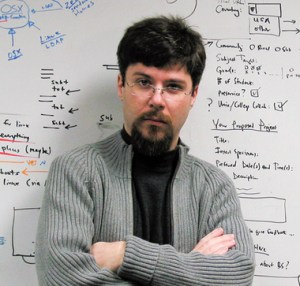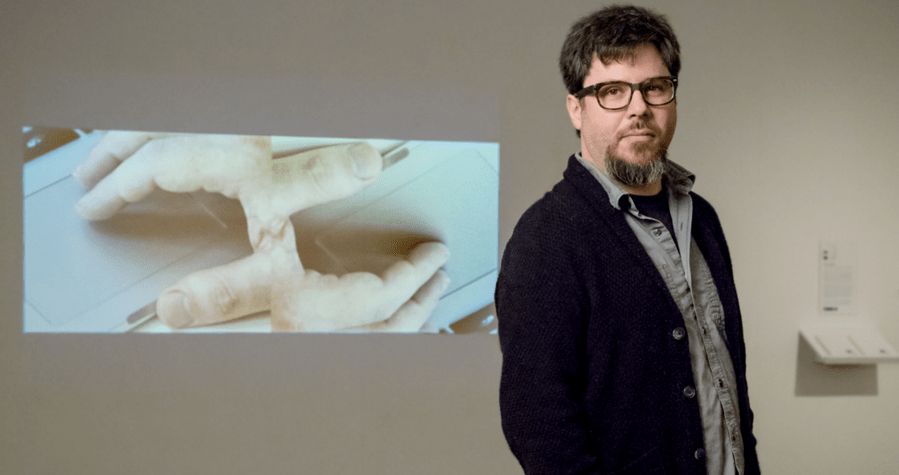BTN.com staff, November 23, 2015
Duke. Miles. Thelonious.
Perhaps no other genre of music is as strongly associated with masters of improvisation as jazz. And improvisation is a decidedly human quality. A computer might be able to write, say, a polished pop music hit, but it could never construct a soulful bebop jazz masterpiece, right?
Well, as it happens, a new project at the University of Illinois Urbana-Champaign is aiming to program those organic musical skills into machines. Through a $2.4 million grant from Defense Advanced Research Projects Agency (DARPA), Illinois assistant professor Ben Grosser and his merry band of musicians/professors/tech nerds hope to expand the capacity of computers to the improvisational intricacies of jazz.
 ?There?s something about jazz that could provide an interesting novel model for communications,? Grosser explained. ?You?re improvising a lot with jazz. You?re thinking the music when you feel it. You?re really interpreting it through that musical space.?
?There?s something about jazz that could provide an interesting novel model for communications,? Grosser explained. ?You?re improvising a lot with jazz. You?re thinking the music when you feel it. You?re really interpreting it through that musical space.?
The brand-new five-year program features collaborations between Grosser - who teaches at the School of Art and Design at Illinois - and professors from the University of Arizona and Oberlin College. The goal is to get beyond the call-and-repeat stage of having a computer just copycat pre-existing tunes.
?Certainly, there have been people who have worked on getting systems to play jazz,? Grosser said. ?We?re trying to take it in a new direction that we?re not trying to emulate a style. We don?t want it to play like Miles Davis. We want it to find its own style.?
The first step of the project is to collect jazz solos and input them into a computer. Then they can begin the work of having it play back the music.
?It?s easy for a human interacting with a computer trying to emulate human interaction,? Grosser said. ?So that?s not so hard. We could do that pretty quickly. And that?s our first step. You have to start somewhere. But that bar we want to cross is a dialogue happening instead of a canned set of responses.?
That stage is only the opening refrain, though. The next goal will be to perfect the real-time performance angle. That will ultimately be the crux of the project: Getting a computer to not only think like a human playing jazz, but truly sound like one.
?We know it?s successful if the human musician perceives the interaction as a real thing,? Grosser said. ?If he feels like he?s in a dialogue in the system, that would be success. It would be grand success. It?s a high bar we?re shooting for.?
While the project is called MUSICA - Musical Improvising Collaborative Agent - the implications of the work go beyond music. Their work intends to change the way humans interact with computers, giving more insight into the best ways to relate between the two.
If anyone is well suited to bringing together music, socialization and technology, it?s Grosser. He?s earned three degrees from Illinois, a bachelor's and master's in music composition and a Master of Fine Arts. While he teaches in the School of Art and Design, he also works with the National Center for Supercomputing Applications on campus. Much of his work focuses on the cultural, social and political effects of software.
[btn-post-package]?I?ve been able to gain some of my broad understandings of different fields and combine them within the context of a research university,? he said of his time at U of I. ?Because there are experts in so many fields, I?ve been able to pick up different perspectives. For example, I?m a professor of Art and Design, but I?m sitting in an office of the NCSA. That?s nice to have. It?s more than just providing resources but creating interdisciplinary teams that work in both the technical and humanistic aspects.?
Grosser is optimistic about the possible outcomes of MUSICA project based on his past experiences of collaboration within and throughout the university.
?As an artist I focus on the ways that software changes who we are,? he said. ?In other words, how does the design of a system affect the way we interact? It pushes the boundaries of what we think art is. Unleashing a computer on the process of an artistic process changes the way we see them.?
If the team is able to harmonize and help the computer pass this musical Turing test, it will be the sweetest sound to Grosser?s well-trained ears.
By Matthew Wood







